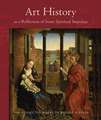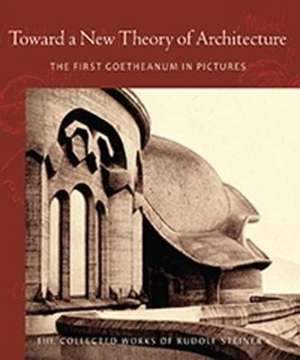Toward a New Theory of Architecture: Collected Works of Rudolf Steiner, cartea 290
Autor Rudolf Steiner Introducere de John Kettle Traducere de Frederick Amrineen Limba Engleză Paperback – 30 mar 2017
In addition to the lecture and slide show that comprise the main content of this volume, the introduction by John Kettle serves to place Steiner's artistic contribution to architecture in the context of early twentieth-century Expressionism and Organicism. Frederick Amrine's thorough bibliographic essay highlights the most important secondary literature on Steiner's architecture and provides a sound entry to further exploration and study.
Din seria Collected Works of Rudolf Steiner
-
 Preț: 136.35 lei
Preț: 136.35 lei -
 Preț: 215.68 lei
Preț: 215.68 lei -
 Preț: 213.21 lei
Preț: 213.21 lei -
 Preț: 154.46 lei
Preț: 154.46 lei -
 Preț: 151.75 lei
Preț: 151.75 lei -
 Preț: 260.45 lei
Preț: 260.45 lei -
 Preț: 258.76 lei
Preț: 258.76 lei -
 Preț: 108.47 lei
Preț: 108.47 lei -
 Preț: 136.86 lei
Preț: 136.86 lei -
 Preț: 115.84 lei
Preț: 115.84 lei -
 Preț: 136.49 lei
Preț: 136.49 lei -
 Preț: 135.09 lei
Preț: 135.09 lei -
 Preț: 108.26 lei
Preț: 108.26 lei -
 Preț: 110.47 lei
Preț: 110.47 lei -
 Preț: 101.01 lei
Preț: 101.01 lei -
 Preț: 143.00 lei
Preț: 143.00 lei -
 Preț: 258.66 lei
Preț: 258.66 lei -
 Preț: 101.17 lei
Preț: 101.17 lei -
 Preț: 151.68 lei
Preț: 151.68 lei -
 Preț: 121.95 lei
Preț: 121.95 lei -
 Preț: 115.58 lei
Preț: 115.58 lei -
 Preț: 257.55 lei
Preț: 257.55 lei -
 Preț: 152.25 lei
Preț: 152.25 lei -
 Preț: 152.00 lei
Preț: 152.00 lei -
 Preț: 136.86 lei
Preț: 136.86 lei -
 Preț: 224.10 lei
Preț: 224.10 lei -
 Preț: 225.17 lei
Preț: 225.17 lei -
 Preț: 259.91 lei
Preț: 259.91 lei -
 Preț: 217.78 lei
Preț: 217.78 lei -
 Preț: 184.77 lei
Preț: 184.77 lei -
 Preț: 194.89 lei
Preț: 194.89 lei -
 Preț: 280.29 lei
Preț: 280.29 lei -
 Preț: 135.88 lei
Preț: 135.88 lei -
 Preț: 153.89 lei
Preț: 153.89 lei -
 Preț: 152.86 lei
Preț: 152.86 lei -
 Preț: 135.32 lei
Preț: 135.32 lei -
 Preț: 145.05 lei
Preț: 145.05 lei -
 Preț: 151.47 lei
Preț: 151.47 lei -
 Preț: 258.37 lei
Preț: 258.37 lei -
 Preț: 152.25 lei
Preț: 152.25 lei -
 Preț: 115.98 lei
Preț: 115.98 lei -
 Preț: 100.76 lei
Preț: 100.76 lei -
 Preț: 216.88 lei
Preț: 216.88 lei -
 Preț: 226.35 lei
Preț: 226.35 lei -
 Preț: 151.47 lei
Preț: 151.47 lei -
 Preț: 217.05 lei
Preț: 217.05 lei - 5%
 Preț: 145.87 lei
Preț: 145.87 lei -
 Preț: 151.75 lei
Preț: 151.75 lei
Preț: 154.81 lei
Nou
Puncte Express: 232
Preț estimativ în valută:
29.63€ • 30.56$ • 25.07£
29.63€ • 30.56$ • 25.07£
Carte indisponibilă temporar
Doresc să fiu notificat când acest titlu va fi disponibil:
Se trimite...
Preluare comenzi: 021 569.72.76
Specificații
ISBN-13: 9781621480976
ISBN-10: 1621480976
Pagini: 226
Dimensiuni: 234 x 198 x 20 mm
Greutate: 0.64 kg
Editura: Rudolf Steiner Press
Seria Collected Works of Rudolf Steiner
ISBN-10: 1621480976
Pagini: 226
Dimensiuni: 234 x 198 x 20 mm
Greutate: 0.64 kg
Editura: Rudolf Steiner Press
Seria Collected Works of Rudolf Steiner
Notă biografică
Rudolf Steiner (1861-1925) was born in the small village of Kraljevec, Austro-Hungarian Empire (now in Croatia), where he grew up. As a young man, he lived in Weimar and Berlin, where he became a well-published scientific, literary, and philosophical scholar, known especially for his work with Goethe's scientific writings. At the beginning of the twentieth century, he began to develop his early philosophical principles into an approach to systematic research into psychological and spiritual phenomena. Formally beginning his spiritual teaching career under the auspices of the Theosophical Society, Steiner came to use the term Anthroposophy (and spiritual science) for his philosophy, spiritual research, and findings. The influence of Steiner's multifaceted genius has led to innovative and holistic approaches in medicine, various therapies, philosophy, religious renewal, Waldorf education, education for special needs, threefold economics, biodynamic agriculture, Goethean science, architecture, and the arts of drama, speech, and eurythmy. In 1924, Rudolf Steiner founded the General Anthroposophical Society, which today has branches throughout the world. He died in Dornach, Switzerland.
